Social Science Perspectives on Climate Change and Environment
VerifiedAdded on 2022/09/12
|14
|4054
|21
Essay
AI Summary
This essay provides an evaluation of contemporary environmental issues, specifically climate change, from a social science perspective. It examines how conceptualizations of the relationship between humans and the environment shape our understanding of the topic, supported by academic literature. The essay offers an overview of different opinions and viewpoints on the human-environment relationship within the context of climate change, critically analyzes the issue through social science theories, and reflects on how a social science perspective informs the understanding of climate change. The paper discusses issues like greenhouse gas emissions, mitigation, adaptation, governance, social and institutional contexts, and technological advancements. The essay emphasizes the importance of social science in addressing climate change by exploring human activities, social behavior, and the implementation of strategies and policies. The essay also touches upon the social dimensions of mitigation and adaptation, governance, and policy, as well as the impact of human societies on the contemporary environment and climate change.
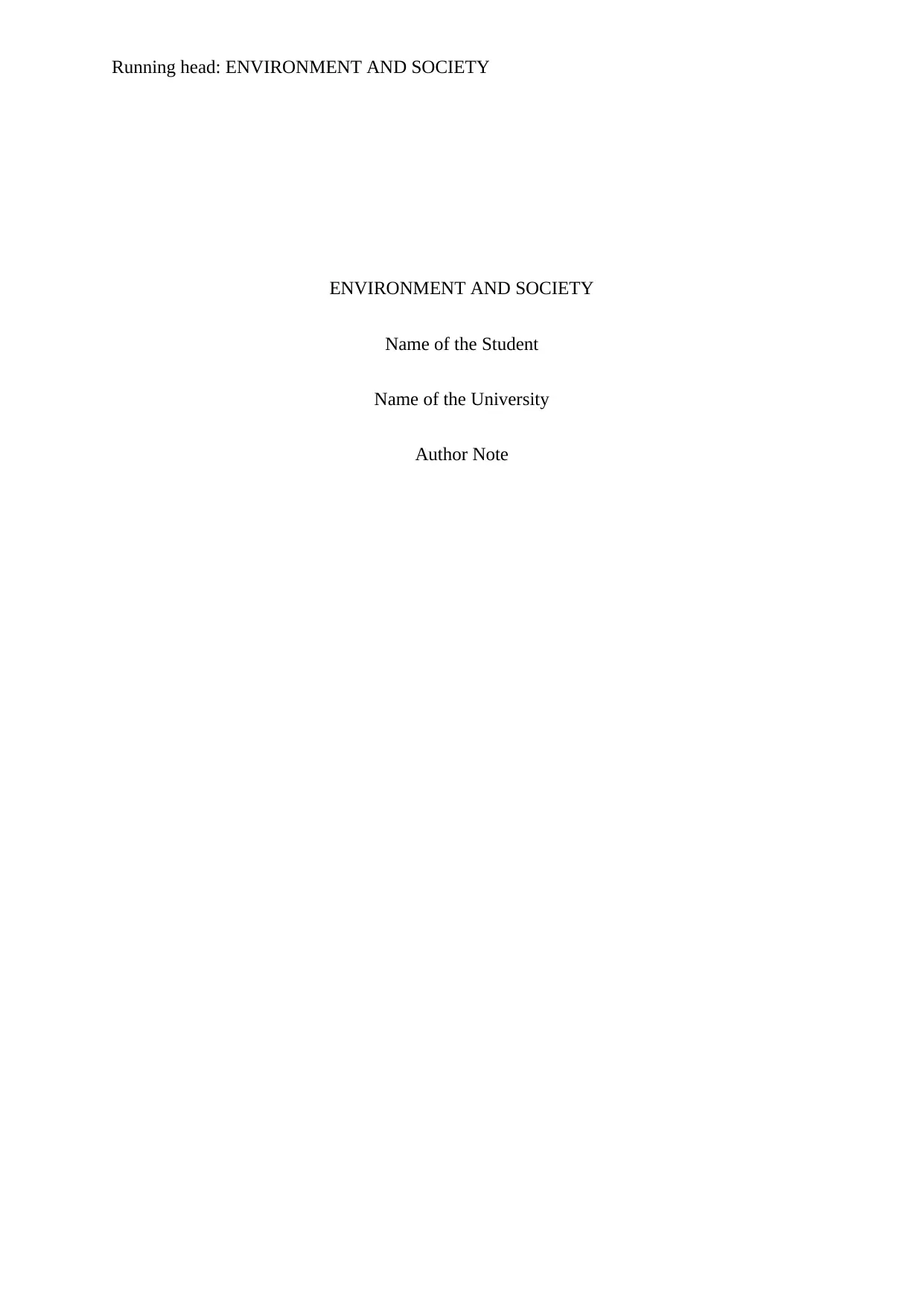
Running head: ENVIRONMENT AND SOCIETY
ENVIRONMENT AND SOCIETY
Name of the Student
Name of the University
Author Note
ENVIRONMENT AND SOCIETY
Name of the Student
Name of the University
Author Note
Paraphrase This Document
Need a fresh take? Get an instant paraphrase of this document with our AI Paraphraser
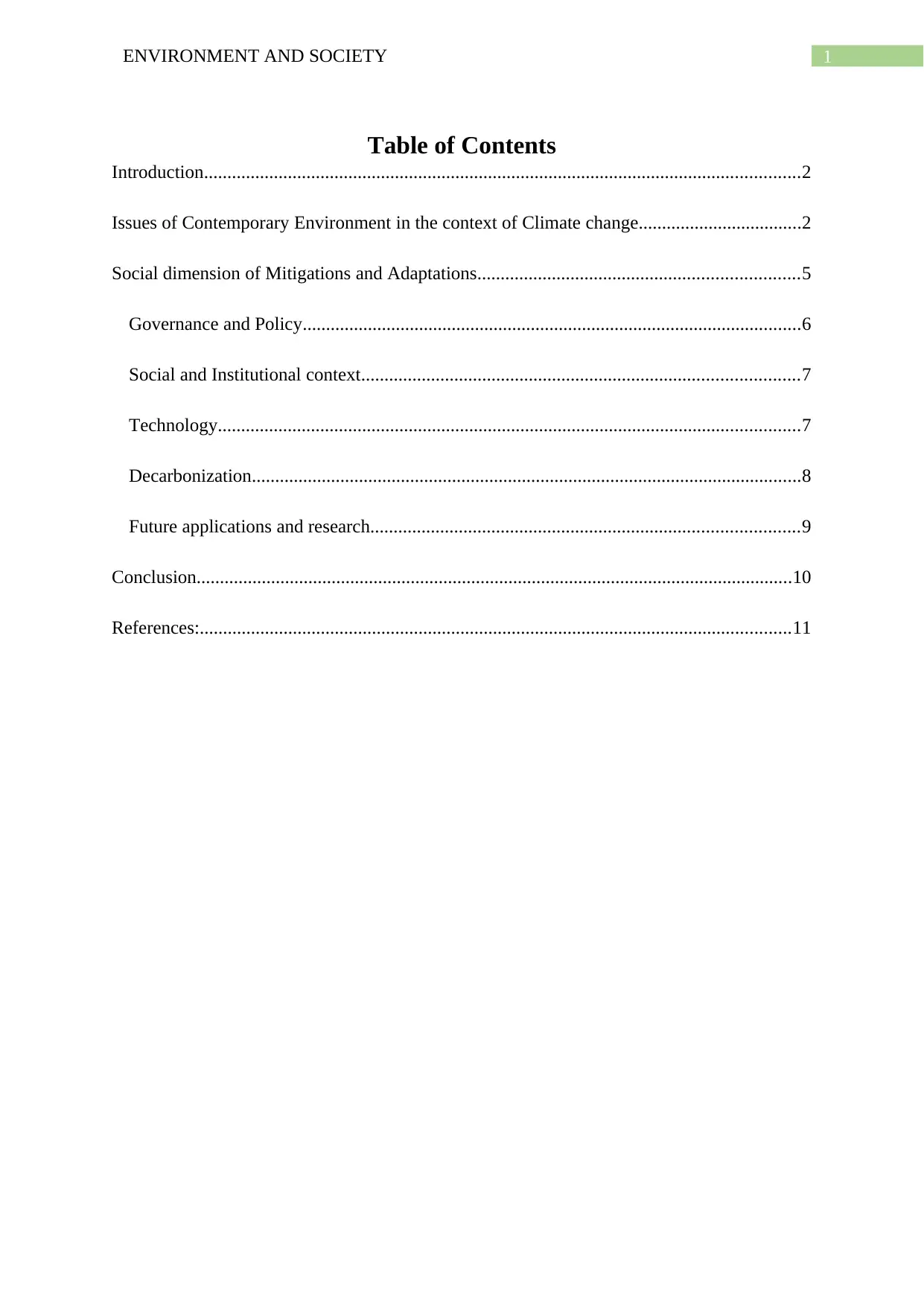
1ENVIRONMENT AND SOCIETY
Table of Contents
Introduction................................................................................................................................2
Issues of Contemporary Environment in the context of Climate change...................................2
Social dimension of Mitigations and Adaptations.....................................................................5
Governance and Policy...........................................................................................................6
Social and Institutional context..............................................................................................7
Technology.............................................................................................................................7
Decarbonization......................................................................................................................8
Future applications and research............................................................................................9
Conclusion................................................................................................................................10
References:...............................................................................................................................11
Table of Contents
Introduction................................................................................................................................2
Issues of Contemporary Environment in the context of Climate change...................................2
Social dimension of Mitigations and Adaptations.....................................................................5
Governance and Policy...........................................................................................................6
Social and Institutional context..............................................................................................7
Technology.............................................................................................................................7
Decarbonization......................................................................................................................8
Future applications and research............................................................................................9
Conclusion................................................................................................................................10
References:...............................................................................................................................11
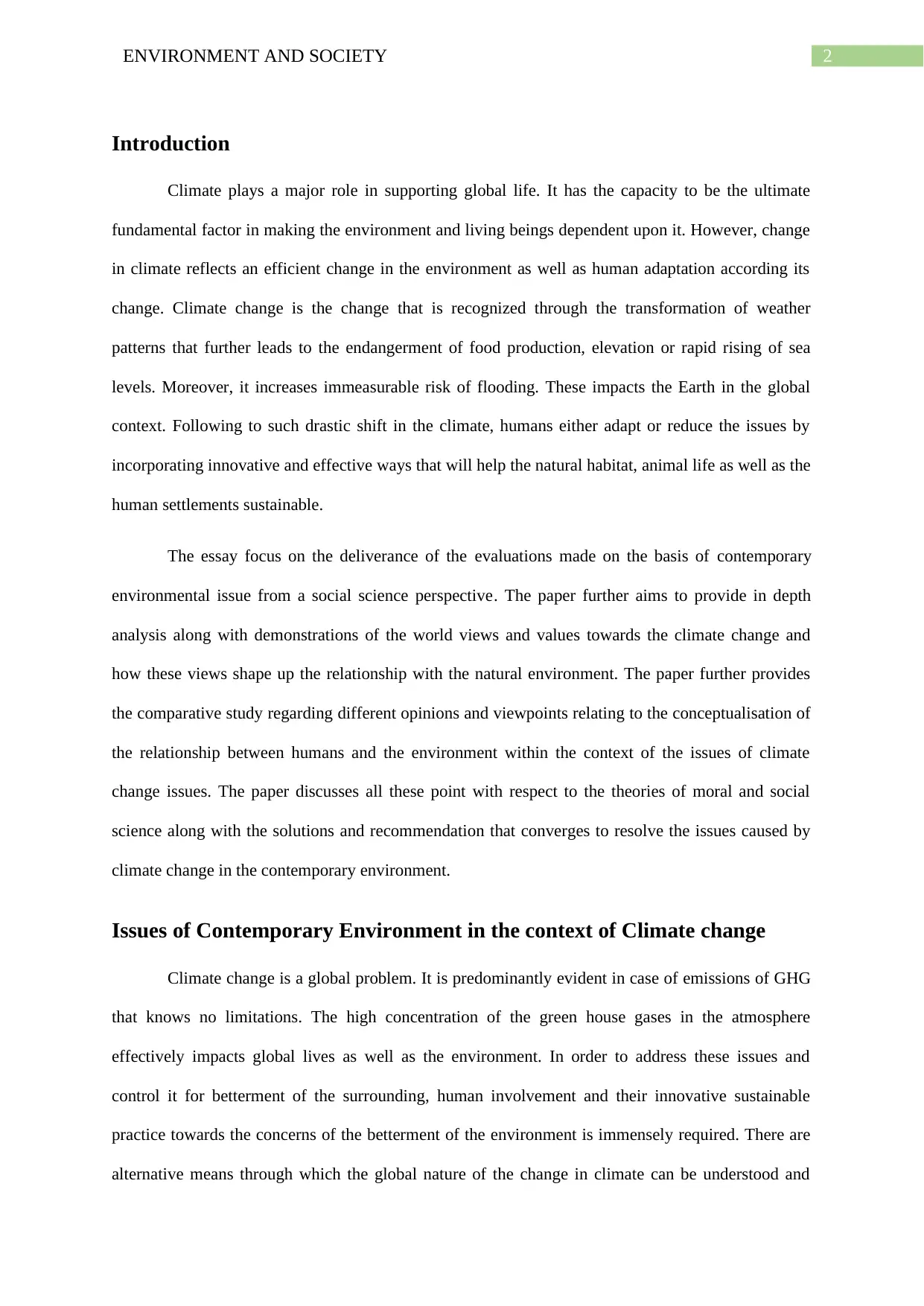
2ENVIRONMENT AND SOCIETY
Introduction
Climate plays a major role in supporting global life. It has the capacity to be the ultimate
fundamental factor in making the environment and living beings dependent upon it. However, change
in climate reflects an efficient change in the environment as well as human adaptation according its
change. Climate change is the change that is recognized through the transformation of weather
patterns that further leads to the endangerment of food production, elevation or rapid rising of sea
levels. Moreover, it increases immeasurable risk of flooding. These impacts the Earth in the global
context. Following to such drastic shift in the climate, humans either adapt or reduce the issues by
incorporating innovative and effective ways that will help the natural habitat, animal life as well as the
human settlements sustainable.
The essay focus on the deliverance of the evaluations made on the basis of contemporary
environmental issue from a social science perspective. The paper further aims to provide in depth
analysis along with demonstrations of the world views and values towards the climate change and
how these views shape up the relationship with the natural environment. The paper further provides
the comparative study regarding different opinions and viewpoints relating to the conceptualisation of
the relationship between humans and the environment within the context of the issues of climate
change issues. The paper discusses all these point with respect to the theories of moral and social
science along with the solutions and recommendation that converges to resolve the issues caused by
climate change in the contemporary environment.
Issues of Contemporary Environment in the context of Climate change
Climate change is a global problem. It is predominantly evident in case of emissions of GHG
that knows no limitations. The high concentration of the green house gases in the atmosphere
effectively impacts global lives as well as the environment. In order to address these issues and
control it for betterment of the surrounding, human involvement and their innovative sustainable
practice towards the concerns of the betterment of the environment is immensely required. There are
alternative means through which the global nature of the change in climate can be understood and
Introduction
Climate plays a major role in supporting global life. It has the capacity to be the ultimate
fundamental factor in making the environment and living beings dependent upon it. However, change
in climate reflects an efficient change in the environment as well as human adaptation according its
change. Climate change is the change that is recognized through the transformation of weather
patterns that further leads to the endangerment of food production, elevation or rapid rising of sea
levels. Moreover, it increases immeasurable risk of flooding. These impacts the Earth in the global
context. Following to such drastic shift in the climate, humans either adapt or reduce the issues by
incorporating innovative and effective ways that will help the natural habitat, animal life as well as the
human settlements sustainable.
The essay focus on the deliverance of the evaluations made on the basis of contemporary
environmental issue from a social science perspective. The paper further aims to provide in depth
analysis along with demonstrations of the world views and values towards the climate change and
how these views shape up the relationship with the natural environment. The paper further provides
the comparative study regarding different opinions and viewpoints relating to the conceptualisation of
the relationship between humans and the environment within the context of the issues of climate
change issues. The paper discusses all these point with respect to the theories of moral and social
science along with the solutions and recommendation that converges to resolve the issues caused by
climate change in the contemporary environment.
Issues of Contemporary Environment in the context of Climate change
Climate change is a global problem. It is predominantly evident in case of emissions of GHG
that knows no limitations. The high concentration of the green house gases in the atmosphere
effectively impacts global lives as well as the environment. In order to address these issues and
control it for betterment of the surrounding, human involvement and their innovative sustainable
practice towards the concerns of the betterment of the environment is immensely required. There are
alternative means through which the global nature of the change in climate can be understood and
⊘ This is a preview!⊘
Do you want full access?
Subscribe today to unlock all pages.

Trusted by 1+ million students worldwide
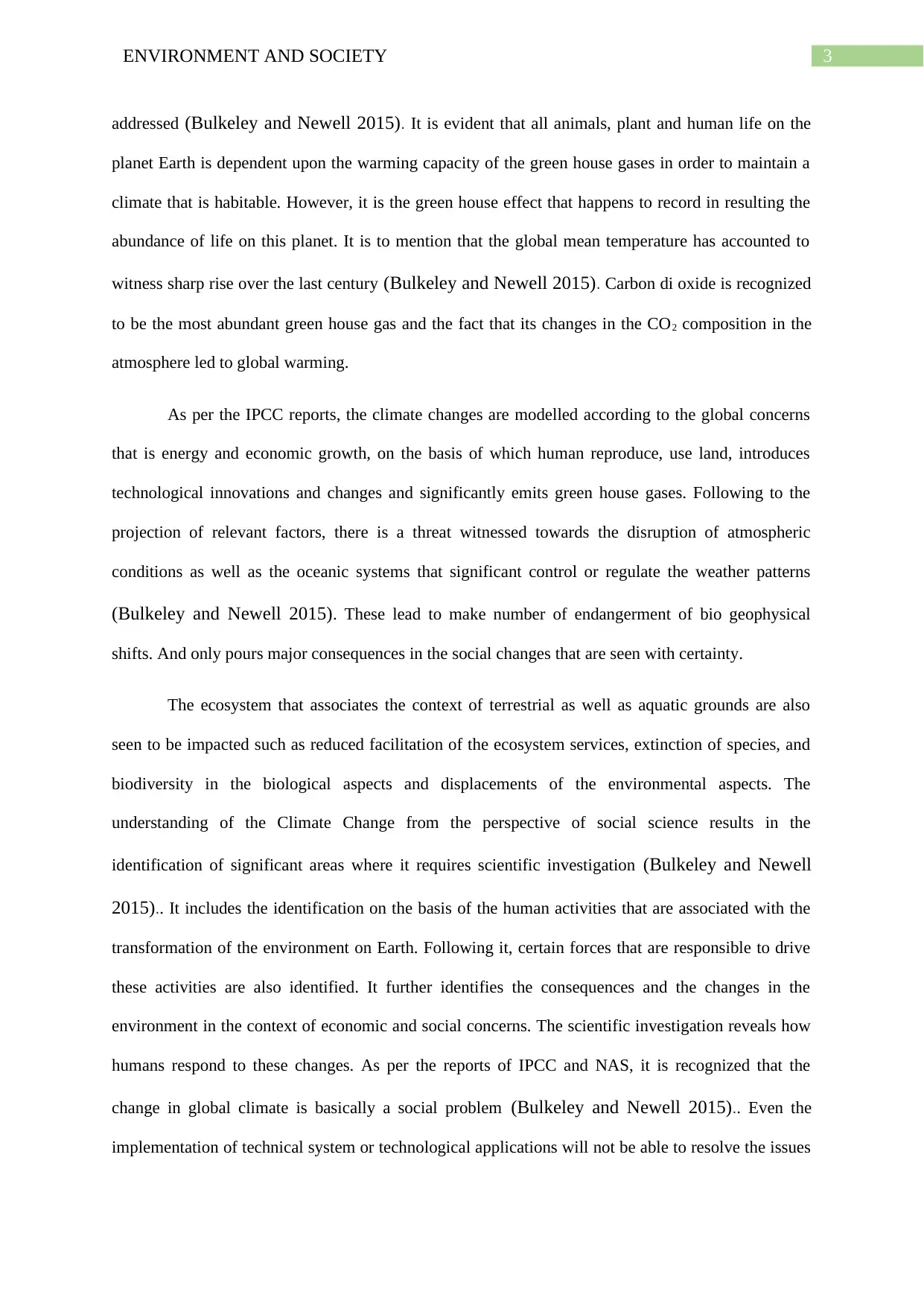
3ENVIRONMENT AND SOCIETY
addressed (Bulkeley and Newell 2015). It is evident that all animals, plant and human life on the
planet Earth is dependent upon the warming capacity of the green house gases in order to maintain a
climate that is habitable. However, it is the green house effect that happens to record in resulting the
abundance of life on this planet. It is to mention that the global mean temperature has accounted to
witness sharp rise over the last century (Bulkeley and Newell 2015). Carbon di oxide is recognized
to be the most abundant green house gas and the fact that its changes in the CO2 composition in the
atmosphere led to global warming.
As per the IPCC reports, the climate changes are modelled according to the global concerns
that is energy and economic growth, on the basis of which human reproduce, use land, introduces
technological innovations and changes and significantly emits green house gases. Following to the
projection of relevant factors, there is a threat witnessed towards the disruption of atmospheric
conditions as well as the oceanic systems that significant control or regulate the weather patterns
(Bulkeley and Newell 2015). These lead to make number of endangerment of bio geophysical
shifts. And only pours major consequences in the social changes that are seen with certainty.
The ecosystem that associates the context of terrestrial as well as aquatic grounds are also
seen to be impacted such as reduced facilitation of the ecosystem services, extinction of species, and
biodiversity in the biological aspects and displacements of the environmental aspects. The
understanding of the Climate Change from the perspective of social science results in the
identification of significant areas where it requires scientific investigation (Bulkeley and Newell
2015).. It includes the identification on the basis of the human activities that are associated with the
transformation of the environment on Earth. Following it, certain forces that are responsible to drive
these activities are also identified. It further identifies the consequences and the changes in the
environment in the context of economic and social concerns. The scientific investigation reveals how
humans respond to these changes. As per the reports of IPCC and NAS, it is recognized that the
change in global climate is basically a social problem (Bulkeley and Newell 2015).. Even the
implementation of technical system or technological applications will not be able to resolve the issues
addressed (Bulkeley and Newell 2015). It is evident that all animals, plant and human life on the
planet Earth is dependent upon the warming capacity of the green house gases in order to maintain a
climate that is habitable. However, it is the green house effect that happens to record in resulting the
abundance of life on this planet. It is to mention that the global mean temperature has accounted to
witness sharp rise over the last century (Bulkeley and Newell 2015). Carbon di oxide is recognized
to be the most abundant green house gas and the fact that its changes in the CO2 composition in the
atmosphere led to global warming.
As per the IPCC reports, the climate changes are modelled according to the global concerns
that is energy and economic growth, on the basis of which human reproduce, use land, introduces
technological innovations and changes and significantly emits green house gases. Following to the
projection of relevant factors, there is a threat witnessed towards the disruption of atmospheric
conditions as well as the oceanic systems that significant control or regulate the weather patterns
(Bulkeley and Newell 2015). These lead to make number of endangerment of bio geophysical
shifts. And only pours major consequences in the social changes that are seen with certainty.
The ecosystem that associates the context of terrestrial as well as aquatic grounds are also
seen to be impacted such as reduced facilitation of the ecosystem services, extinction of species, and
biodiversity in the biological aspects and displacements of the environmental aspects. The
understanding of the Climate Change from the perspective of social science results in the
identification of significant areas where it requires scientific investigation (Bulkeley and Newell
2015).. It includes the identification on the basis of the human activities that are associated with the
transformation of the environment on Earth. Following it, certain forces that are responsible to drive
these activities are also identified. It further identifies the consequences and the changes in the
environment in the context of economic and social concerns. The scientific investigation reveals how
humans respond to these changes. As per the reports of IPCC and NAS, it is recognized that the
change in global climate is basically a social problem (Bulkeley and Newell 2015).. Even the
implementation of technical system or technological applications will not be able to resolve the issues
Paraphrase This Document
Need a fresh take? Get an instant paraphrase of this document with our AI Paraphraser
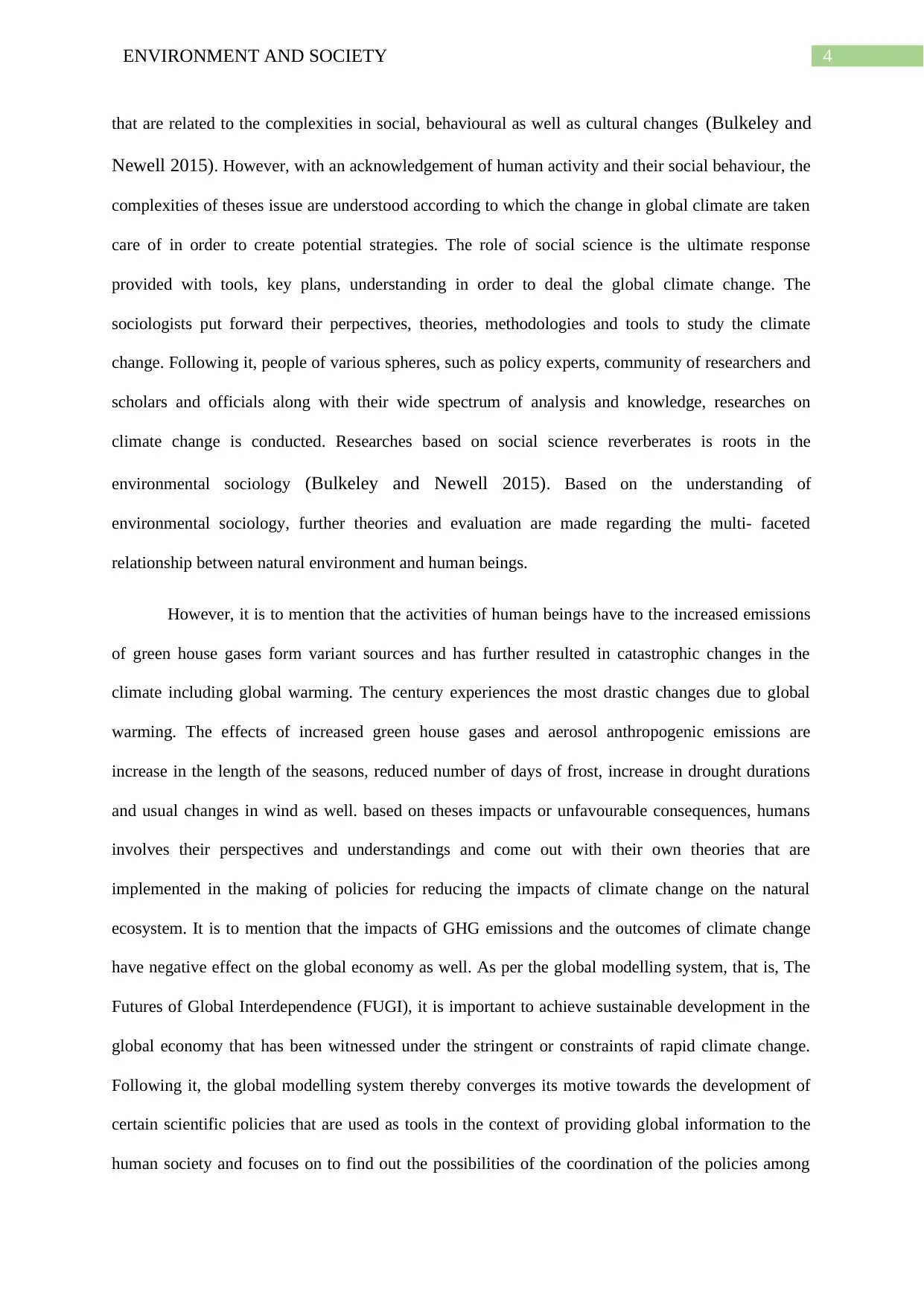
4ENVIRONMENT AND SOCIETY
that are related to the complexities in social, behavioural as well as cultural changes (Bulkeley and
Newell 2015). However, with an acknowledgement of human activity and their social behaviour, the
complexities of theses issue are understood according to which the change in global climate are taken
care of in order to create potential strategies. The role of social science is the ultimate response
provided with tools, key plans, understanding in order to deal the global climate change. The
sociologists put forward their perpectives, theories, methodologies and tools to study the climate
change. Following it, people of various spheres, such as policy experts, community of researchers and
scholars and officials along with their wide spectrum of analysis and knowledge, researches on
climate change is conducted. Researches based on social science reverberates is roots in the
environmental sociology (Bulkeley and Newell 2015). Based on the understanding of
environmental sociology, further theories and evaluation are made regarding the multi- faceted
relationship between natural environment and human beings.
However, it is to mention that the activities of human beings have to the increased emissions
of green house gases form variant sources and has further resulted in catastrophic changes in the
climate including global warming. The century experiences the most drastic changes due to global
warming. The effects of increased green house gases and aerosol anthropogenic emissions are
increase in the length of the seasons, reduced number of days of frost, increase in drought durations
and usual changes in wind as well. based on theses impacts or unfavourable consequences, humans
involves their perspectives and understandings and come out with their own theories that are
implemented in the making of policies for reducing the impacts of climate change on the natural
ecosystem. It is to mention that the impacts of GHG emissions and the outcomes of climate change
have negative effect on the global economy as well. As per the global modelling system, that is, The
Futures of Global Interdependence (FUGI), it is important to achieve sustainable development in the
global economy that has been witnessed under the stringent or constraints of rapid climate change.
Following it, the global modelling system thereby converges its motive towards the development of
certain scientific policies that are used as tools in the context of providing global information to the
human society and focuses on to find out the possibilities of the coordination of the policies among
that are related to the complexities in social, behavioural as well as cultural changes (Bulkeley and
Newell 2015). However, with an acknowledgement of human activity and their social behaviour, the
complexities of theses issue are understood according to which the change in global climate are taken
care of in order to create potential strategies. The role of social science is the ultimate response
provided with tools, key plans, understanding in order to deal the global climate change. The
sociologists put forward their perpectives, theories, methodologies and tools to study the climate
change. Following it, people of various spheres, such as policy experts, community of researchers and
scholars and officials along with their wide spectrum of analysis and knowledge, researches on
climate change is conducted. Researches based on social science reverberates is roots in the
environmental sociology (Bulkeley and Newell 2015). Based on the understanding of
environmental sociology, further theories and evaluation are made regarding the multi- faceted
relationship between natural environment and human beings.
However, it is to mention that the activities of human beings have to the increased emissions
of green house gases form variant sources and has further resulted in catastrophic changes in the
climate including global warming. The century experiences the most drastic changes due to global
warming. The effects of increased green house gases and aerosol anthropogenic emissions are
increase in the length of the seasons, reduced number of days of frost, increase in drought durations
and usual changes in wind as well. based on theses impacts or unfavourable consequences, humans
involves their perspectives and understandings and come out with their own theories that are
implemented in the making of policies for reducing the impacts of climate change on the natural
ecosystem. It is to mention that the impacts of GHG emissions and the outcomes of climate change
have negative effect on the global economy as well. As per the global modelling system, that is, The
Futures of Global Interdependence (FUGI), it is important to achieve sustainable development in the
global economy that has been witnessed under the stringent or constraints of rapid climate change.
Following it, the global modelling system thereby converges its motive towards the development of
certain scientific policies that are used as tools in the context of providing global information to the
human society and focuses on to find out the possibilities of the coordination of the policies among
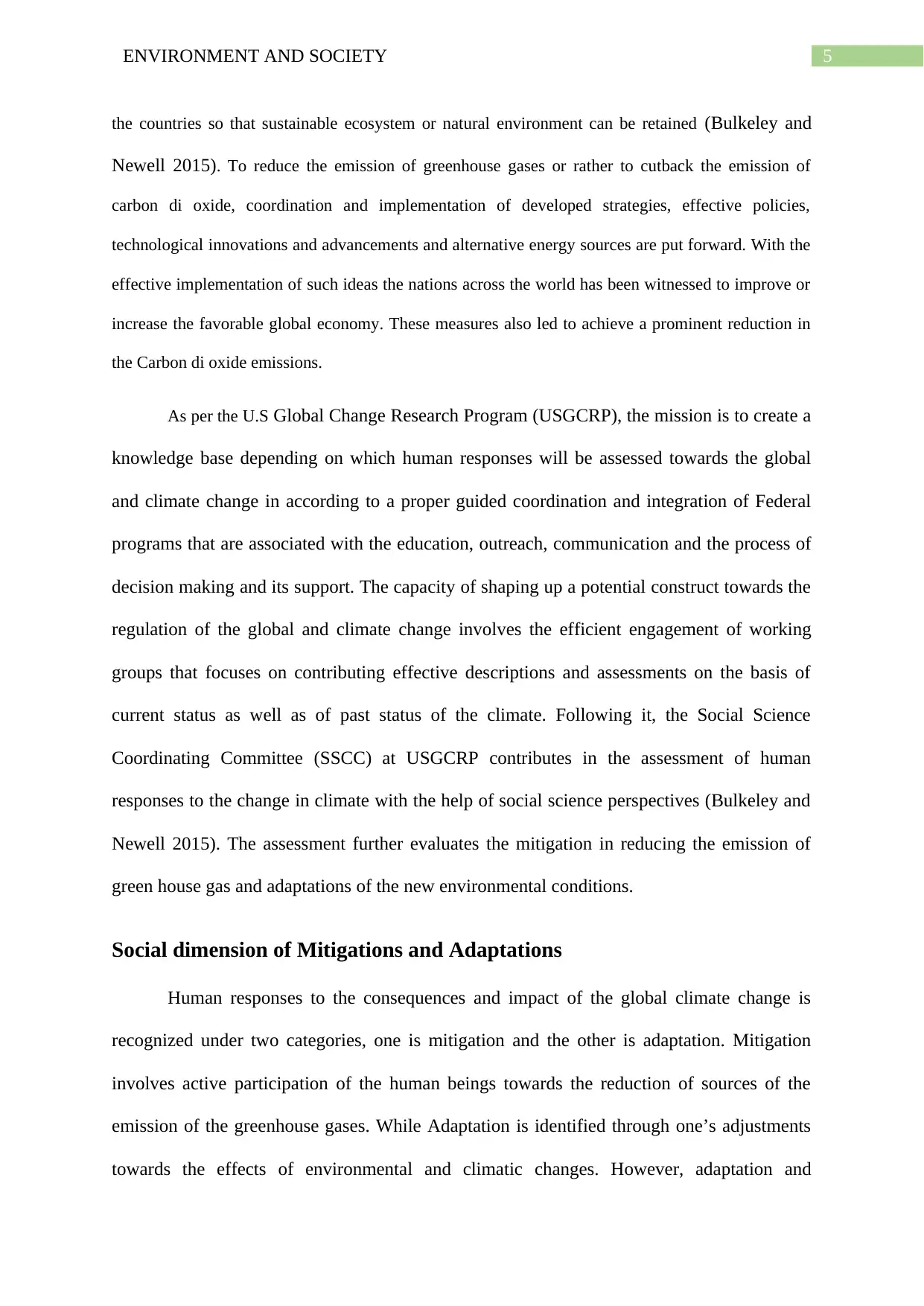
5ENVIRONMENT AND SOCIETY
the countries so that sustainable ecosystem or natural environment can be retained (Bulkeley and
Newell 2015). To reduce the emission of greenhouse gases or rather to cutback the emission of
carbon di oxide, coordination and implementation of developed strategies, effective policies,
technological innovations and advancements and alternative energy sources are put forward. With the
effective implementation of such ideas the nations across the world has been witnessed to improve or
increase the favorable global economy. These measures also led to achieve a prominent reduction in
the Carbon di oxide emissions.
As per the U.S Global Change Research Program (USGCRP), the mission is to create a
knowledge base depending on which human responses will be assessed towards the global
and climate change in according to a proper guided coordination and integration of Federal
programs that are associated with the education, outreach, communication and the process of
decision making and its support. The capacity of shaping up a potential construct towards the
regulation of the global and climate change involves the efficient engagement of working
groups that focuses on contributing effective descriptions and assessments on the basis of
current status as well as of past status of the climate. Following it, the Social Science
Coordinating Committee (SSCC) at USGCRP contributes in the assessment of human
responses to the change in climate with the help of social science perspectives (Bulkeley and
Newell 2015). The assessment further evaluates the mitigation in reducing the emission of
green house gas and adaptations of the new environmental conditions.
Social dimension of Mitigations and Adaptations
Human responses to the consequences and impact of the global climate change is
recognized under two categories, one is mitigation and the other is adaptation. Mitigation
involves active participation of the human beings towards the reduction of sources of the
emission of the greenhouse gases. While Adaptation is identified through one’s adjustments
towards the effects of environmental and climatic changes. However, adaptation and
the countries so that sustainable ecosystem or natural environment can be retained (Bulkeley and
Newell 2015). To reduce the emission of greenhouse gases or rather to cutback the emission of
carbon di oxide, coordination and implementation of developed strategies, effective policies,
technological innovations and advancements and alternative energy sources are put forward. With the
effective implementation of such ideas the nations across the world has been witnessed to improve or
increase the favorable global economy. These measures also led to achieve a prominent reduction in
the Carbon di oxide emissions.
As per the U.S Global Change Research Program (USGCRP), the mission is to create a
knowledge base depending on which human responses will be assessed towards the global
and climate change in according to a proper guided coordination and integration of Federal
programs that are associated with the education, outreach, communication and the process of
decision making and its support. The capacity of shaping up a potential construct towards the
regulation of the global and climate change involves the efficient engagement of working
groups that focuses on contributing effective descriptions and assessments on the basis of
current status as well as of past status of the climate. Following it, the Social Science
Coordinating Committee (SSCC) at USGCRP contributes in the assessment of human
responses to the change in climate with the help of social science perspectives (Bulkeley and
Newell 2015). The assessment further evaluates the mitigation in reducing the emission of
green house gas and adaptations of the new environmental conditions.
Social dimension of Mitigations and Adaptations
Human responses to the consequences and impact of the global climate change is
recognized under two categories, one is mitigation and the other is adaptation. Mitigation
involves active participation of the human beings towards the reduction of sources of the
emission of the greenhouse gases. While Adaptation is identified through one’s adjustments
towards the effects of environmental and climatic changes. However, adaptation and
⊘ This is a preview!⊘
Do you want full access?
Subscribe today to unlock all pages.

Trusted by 1+ million students worldwide
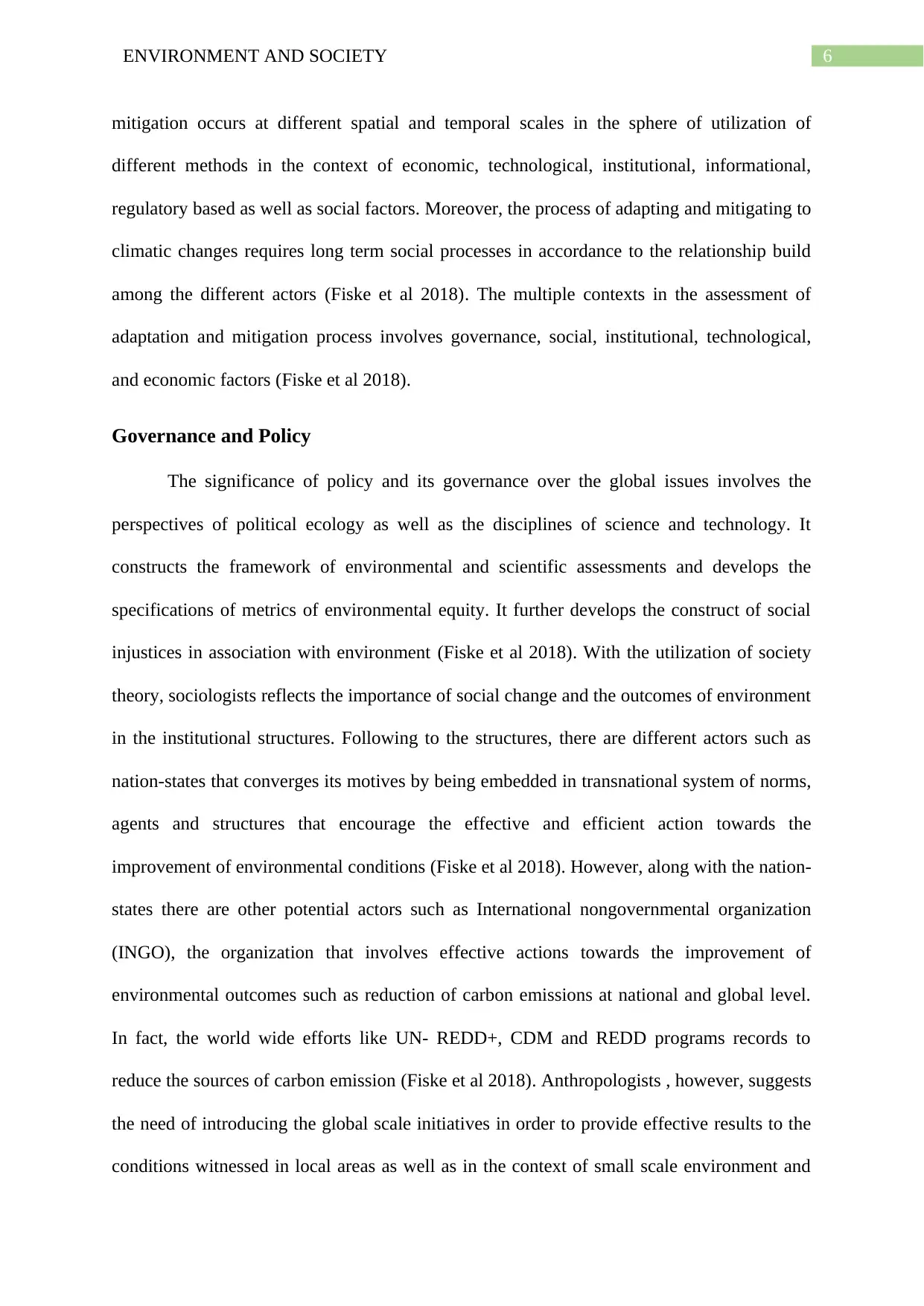
6ENVIRONMENT AND SOCIETY
mitigation occurs at different spatial and temporal scales in the sphere of utilization of
different methods in the context of economic, technological, institutional, informational,
regulatory based as well as social factors. Moreover, the process of adapting and mitigating to
climatic changes requires long term social processes in accordance to the relationship build
among the different actors (Fiske et al 2018). The multiple contexts in the assessment of
adaptation and mitigation process involves governance, social, institutional, technological,
and economic factors (Fiske et al 2018).
Governance and Policy
The significance of policy and its governance over the global issues involves the
perspectives of political ecology as well as the disciplines of science and technology. It
constructs the framework of environmental and scientific assessments and develops the
specifications of metrics of environmental equity. It further develops the construct of social
injustices in association with environment (Fiske et al 2018). With the utilization of society
theory, sociologists reflects the importance of social change and the outcomes of environment
in the institutional structures. Following to the structures, there are different actors such as
nation-states that converges its motives by being embedded in transnational system of norms,
agents and structures that encourage the effective and efficient action towards the
improvement of environmental conditions (Fiske et al 2018). However, along with the nation-
states there are other potential actors such as International nongovernmental organization
(INGO), the organization that involves effective actions towards the improvement of
environmental outcomes such as reduction of carbon emissions at national and global level.
In fact, the world wide efforts like UN- REDD+, CDM and REDD programs records to
reduce the sources of carbon emission (Fiske et al 2018). Anthropologists , however, suggests
the need of introducing the global scale initiatives in order to provide effective results to the
conditions witnessed in local areas as well as in the context of small scale environment and
mitigation occurs at different spatial and temporal scales in the sphere of utilization of
different methods in the context of economic, technological, institutional, informational,
regulatory based as well as social factors. Moreover, the process of adapting and mitigating to
climatic changes requires long term social processes in accordance to the relationship build
among the different actors (Fiske et al 2018). The multiple contexts in the assessment of
adaptation and mitigation process involves governance, social, institutional, technological,
and economic factors (Fiske et al 2018).
Governance and Policy
The significance of policy and its governance over the global issues involves the
perspectives of political ecology as well as the disciplines of science and technology. It
constructs the framework of environmental and scientific assessments and develops the
specifications of metrics of environmental equity. It further develops the construct of social
injustices in association with environment (Fiske et al 2018). With the utilization of society
theory, sociologists reflects the importance of social change and the outcomes of environment
in the institutional structures. Following to the structures, there are different actors such as
nation-states that converges its motives by being embedded in transnational system of norms,
agents and structures that encourage the effective and efficient action towards the
improvement of environmental conditions (Fiske et al 2018). However, along with the nation-
states there are other potential actors such as International nongovernmental organization
(INGO), the organization that involves effective actions towards the improvement of
environmental outcomes such as reduction of carbon emissions at national and global level.
In fact, the world wide efforts like UN- REDD+, CDM and REDD programs records to
reduce the sources of carbon emission (Fiske et al 2018). Anthropologists , however, suggests
the need of introducing the global scale initiatives in order to provide effective results to the
conditions witnessed in local areas as well as in the context of small scale environment and
Paraphrase This Document
Need a fresh take? Get an instant paraphrase of this document with our AI Paraphraser
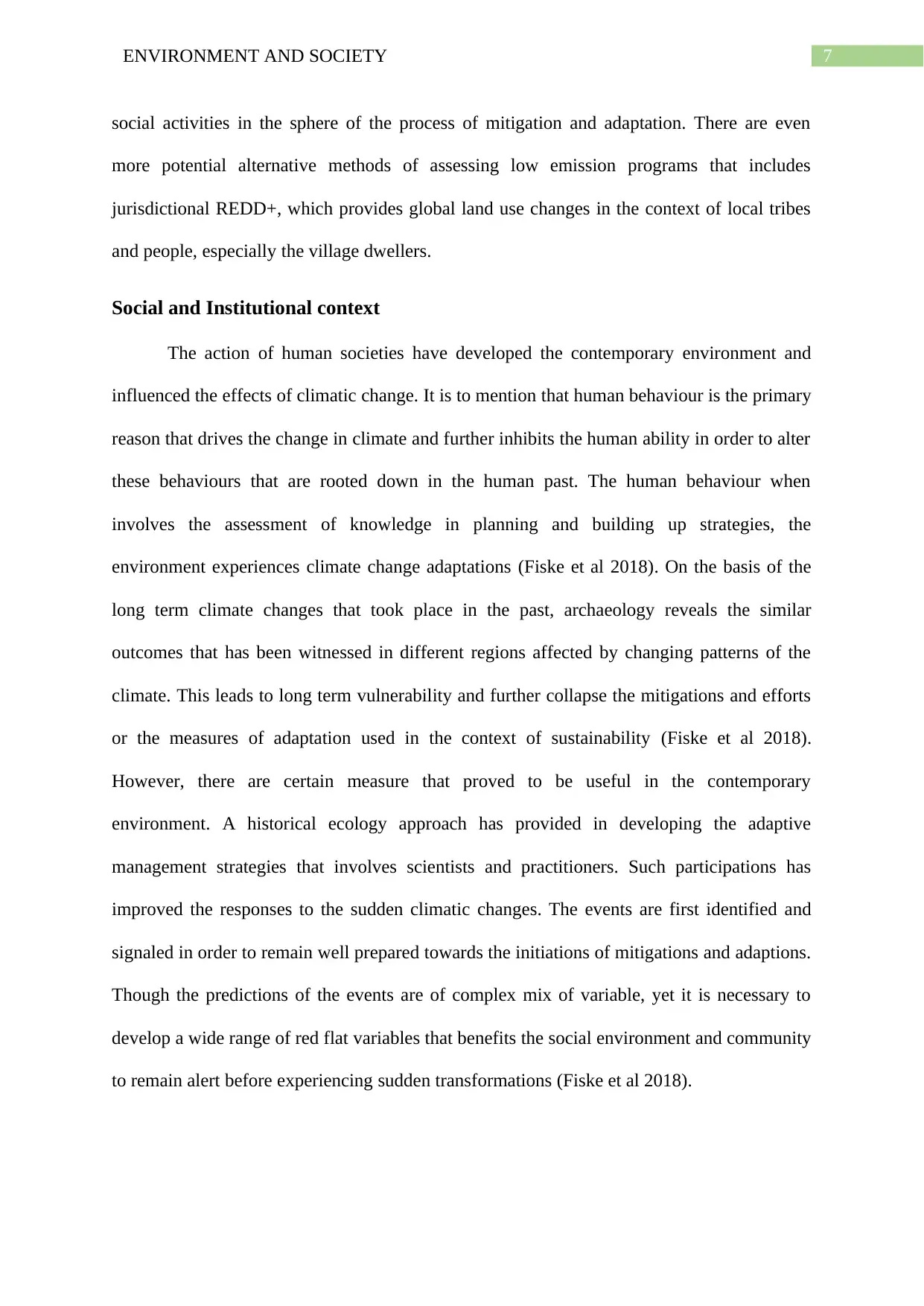
7ENVIRONMENT AND SOCIETY
social activities in the sphere of the process of mitigation and adaptation. There are even
more potential alternative methods of assessing low emission programs that includes
jurisdictional REDD+, which provides global land use changes in the context of local tribes
and people, especially the village dwellers.
Social and Institutional context
The action of human societies have developed the contemporary environment and
influenced the effects of climatic change. It is to mention that human behaviour is the primary
reason that drives the change in climate and further inhibits the human ability in order to alter
these behaviours that are rooted down in the human past. The human behaviour when
involves the assessment of knowledge in planning and building up strategies, the
environment experiences climate change adaptations (Fiske et al 2018). On the basis of the
long term climate changes that took place in the past, archaeology reveals the similar
outcomes that has been witnessed in different regions affected by changing patterns of the
climate. This leads to long term vulnerability and further collapse the mitigations and efforts
or the measures of adaptation used in the context of sustainability (Fiske et al 2018).
However, there are certain measure that proved to be useful in the contemporary
environment. A historical ecology approach has provided in developing the adaptive
management strategies that involves scientists and practitioners. Such participations has
improved the responses to the sudden climatic changes. The events are first identified and
signaled in order to remain well prepared towards the initiations of mitigations and adaptions.
Though the predictions of the events are of complex mix of variable, yet it is necessary to
develop a wide range of red flat variables that benefits the social environment and community
to remain alert before experiencing sudden transformations (Fiske et al 2018).
social activities in the sphere of the process of mitigation and adaptation. There are even
more potential alternative methods of assessing low emission programs that includes
jurisdictional REDD+, which provides global land use changes in the context of local tribes
and people, especially the village dwellers.
Social and Institutional context
The action of human societies have developed the contemporary environment and
influenced the effects of climatic change. It is to mention that human behaviour is the primary
reason that drives the change in climate and further inhibits the human ability in order to alter
these behaviours that are rooted down in the human past. The human behaviour when
involves the assessment of knowledge in planning and building up strategies, the
environment experiences climate change adaptations (Fiske et al 2018). On the basis of the
long term climate changes that took place in the past, archaeology reveals the similar
outcomes that has been witnessed in different regions affected by changing patterns of the
climate. This leads to long term vulnerability and further collapse the mitigations and efforts
or the measures of adaptation used in the context of sustainability (Fiske et al 2018).
However, there are certain measure that proved to be useful in the contemporary
environment. A historical ecology approach has provided in developing the adaptive
management strategies that involves scientists and practitioners. Such participations has
improved the responses to the sudden climatic changes. The events are first identified and
signaled in order to remain well prepared towards the initiations of mitigations and adaptions.
Though the predictions of the events are of complex mix of variable, yet it is necessary to
develop a wide range of red flat variables that benefits the social environment and community
to remain alert before experiencing sudden transformations (Fiske et al 2018).
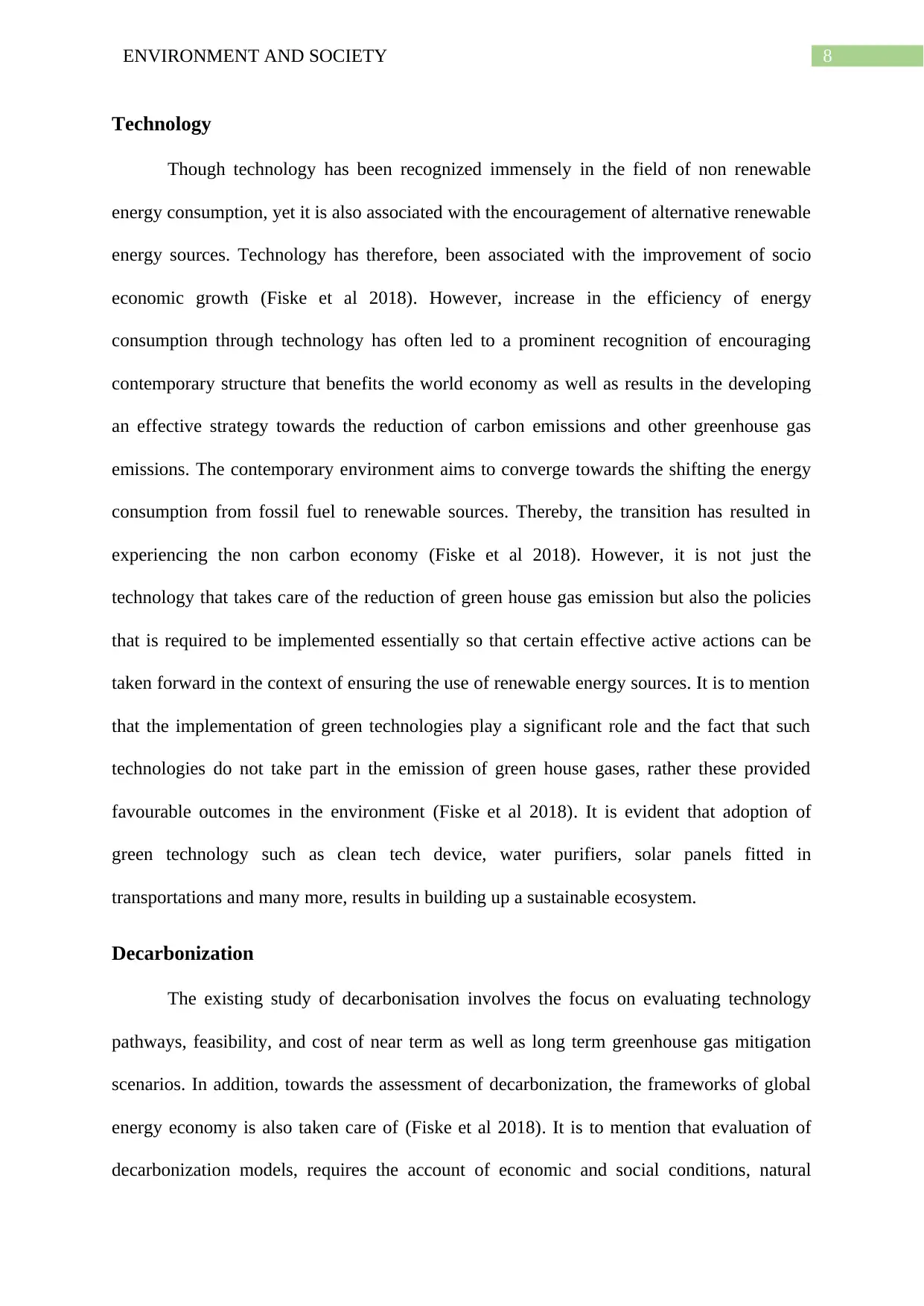
8ENVIRONMENT AND SOCIETY
Technology
Though technology has been recognized immensely in the field of non renewable
energy consumption, yet it is also associated with the encouragement of alternative renewable
energy sources. Technology has therefore, been associated with the improvement of socio
economic growth (Fiske et al 2018). However, increase in the efficiency of energy
consumption through technology has often led to a prominent recognition of encouraging
contemporary structure that benefits the world economy as well as results in the developing
an effective strategy towards the reduction of carbon emissions and other greenhouse gas
emissions. The contemporary environment aims to converge towards the shifting the energy
consumption from fossil fuel to renewable sources. Thereby, the transition has resulted in
experiencing the non carbon economy (Fiske et al 2018). However, it is not just the
technology that takes care of the reduction of green house gas emission but also the policies
that is required to be implemented essentially so that certain effective active actions can be
taken forward in the context of ensuring the use of renewable energy sources. It is to mention
that the implementation of green technologies play a significant role and the fact that such
technologies do not take part in the emission of green house gases, rather these provided
favourable outcomes in the environment (Fiske et al 2018). It is evident that adoption of
green technology such as clean tech device, water purifiers, solar panels fitted in
transportations and many more, results in building up a sustainable ecosystem.
Decarbonization
The existing study of decarbonisation involves the focus on evaluating technology
pathways, feasibility, and cost of near term as well as long term greenhouse gas mitigation
scenarios. In addition, towards the assessment of decarbonization, the frameworks of global
energy economy is also taken care of (Fiske et al 2018). It is to mention that evaluation of
decarbonization models, requires the account of economic and social conditions, natural
Technology
Though technology has been recognized immensely in the field of non renewable
energy consumption, yet it is also associated with the encouragement of alternative renewable
energy sources. Technology has therefore, been associated with the improvement of socio
economic growth (Fiske et al 2018). However, increase in the efficiency of energy
consumption through technology has often led to a prominent recognition of encouraging
contemporary structure that benefits the world economy as well as results in the developing
an effective strategy towards the reduction of carbon emissions and other greenhouse gas
emissions. The contemporary environment aims to converge towards the shifting the energy
consumption from fossil fuel to renewable sources. Thereby, the transition has resulted in
experiencing the non carbon economy (Fiske et al 2018). However, it is not just the
technology that takes care of the reduction of green house gas emission but also the policies
that is required to be implemented essentially so that certain effective active actions can be
taken forward in the context of ensuring the use of renewable energy sources. It is to mention
that the implementation of green technologies play a significant role and the fact that such
technologies do not take part in the emission of green house gases, rather these provided
favourable outcomes in the environment (Fiske et al 2018). It is evident that adoption of
green technology such as clean tech device, water purifiers, solar panels fitted in
transportations and many more, results in building up a sustainable ecosystem.
Decarbonization
The existing study of decarbonisation involves the focus on evaluating technology
pathways, feasibility, and cost of near term as well as long term greenhouse gas mitigation
scenarios. In addition, towards the assessment of decarbonization, the frameworks of global
energy economy is also taken care of (Fiske et al 2018). It is to mention that evaluation of
decarbonization models, requires the account of economic and social conditions, natural
⊘ This is a preview!⊘
Do you want full access?
Subscribe today to unlock all pages.

Trusted by 1+ million students worldwide
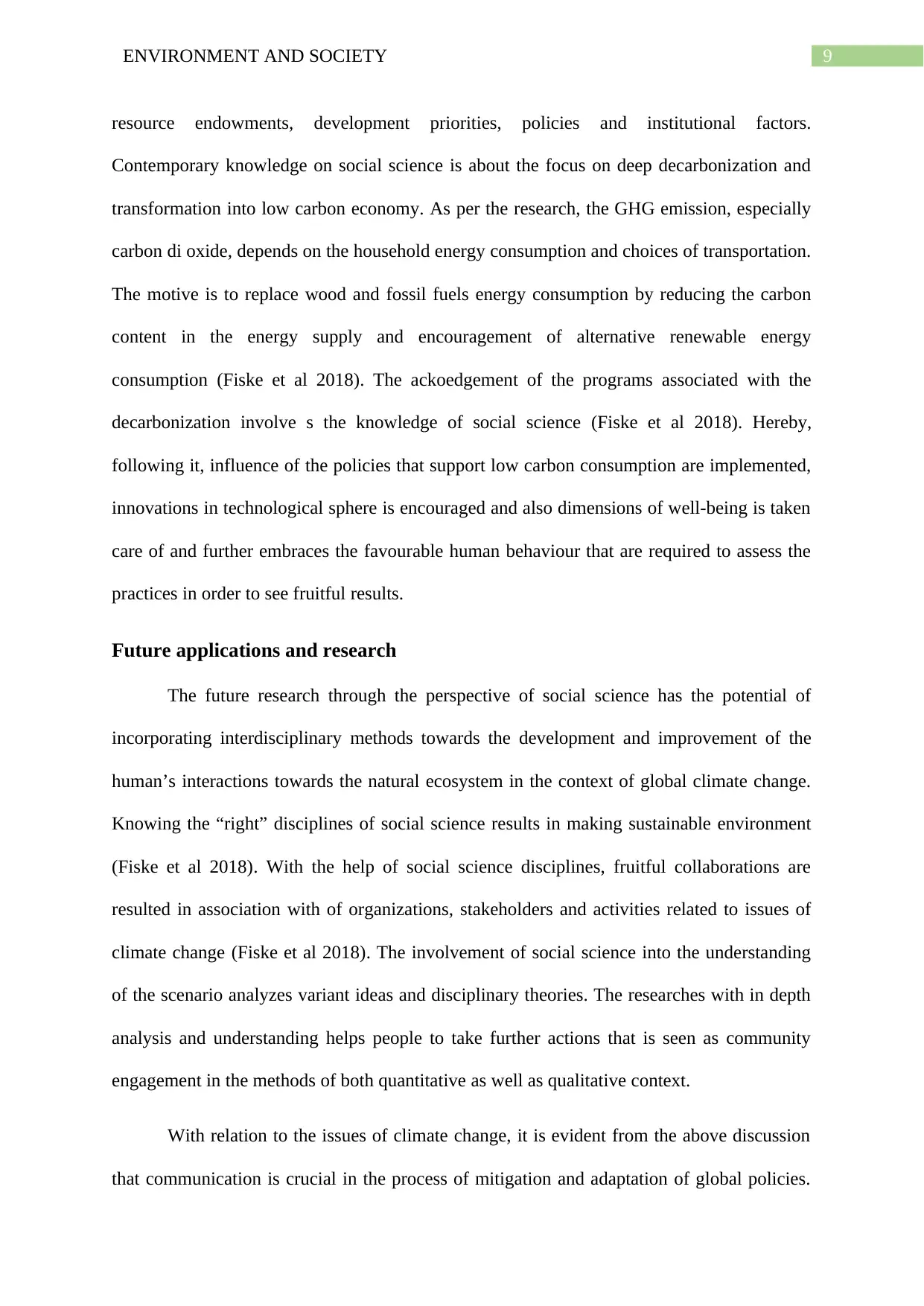
9ENVIRONMENT AND SOCIETY
resource endowments, development priorities, policies and institutional factors.
Contemporary knowledge on social science is about the focus on deep decarbonization and
transformation into low carbon economy. As per the research, the GHG emission, especially
carbon di oxide, depends on the household energy consumption and choices of transportation.
The motive is to replace wood and fossil fuels energy consumption by reducing the carbon
content in the energy supply and encouragement of alternative renewable energy
consumption (Fiske et al 2018). The ackoedgement of the programs associated with the
decarbonization involve s the knowledge of social science (Fiske et al 2018). Hereby,
following it, influence of the policies that support low carbon consumption are implemented,
innovations in technological sphere is encouraged and also dimensions of well-being is taken
care of and further embraces the favourable human behaviour that are required to assess the
practices in order to see fruitful results.
Future applications and research
The future research through the perspective of social science has the potential of
incorporating interdisciplinary methods towards the development and improvement of the
human’s interactions towards the natural ecosystem in the context of global climate change.
Knowing the “right” disciplines of social science results in making sustainable environment
(Fiske et al 2018). With the help of social science disciplines, fruitful collaborations are
resulted in association with of organizations, stakeholders and activities related to issues of
climate change (Fiske et al 2018). The involvement of social science into the understanding
of the scenario analyzes variant ideas and disciplinary theories. The researches with in depth
analysis and understanding helps people to take further actions that is seen as community
engagement in the methods of both quantitative as well as qualitative context.
With relation to the issues of climate change, it is evident from the above discussion
that communication is crucial in the process of mitigation and adaptation of global policies.
resource endowments, development priorities, policies and institutional factors.
Contemporary knowledge on social science is about the focus on deep decarbonization and
transformation into low carbon economy. As per the research, the GHG emission, especially
carbon di oxide, depends on the household energy consumption and choices of transportation.
The motive is to replace wood and fossil fuels energy consumption by reducing the carbon
content in the energy supply and encouragement of alternative renewable energy
consumption (Fiske et al 2018). The ackoedgement of the programs associated with the
decarbonization involve s the knowledge of social science (Fiske et al 2018). Hereby,
following it, influence of the policies that support low carbon consumption are implemented,
innovations in technological sphere is encouraged and also dimensions of well-being is taken
care of and further embraces the favourable human behaviour that are required to assess the
practices in order to see fruitful results.
Future applications and research
The future research through the perspective of social science has the potential of
incorporating interdisciplinary methods towards the development and improvement of the
human’s interactions towards the natural ecosystem in the context of global climate change.
Knowing the “right” disciplines of social science results in making sustainable environment
(Fiske et al 2018). With the help of social science disciplines, fruitful collaborations are
resulted in association with of organizations, stakeholders and activities related to issues of
climate change (Fiske et al 2018). The involvement of social science into the understanding
of the scenario analyzes variant ideas and disciplinary theories. The researches with in depth
analysis and understanding helps people to take further actions that is seen as community
engagement in the methods of both quantitative as well as qualitative context.
With relation to the issues of climate change, it is evident from the above discussion
that communication is crucial in the process of mitigation and adaptation of global policies.
Paraphrase This Document
Need a fresh take? Get an instant paraphrase of this document with our AI Paraphraser
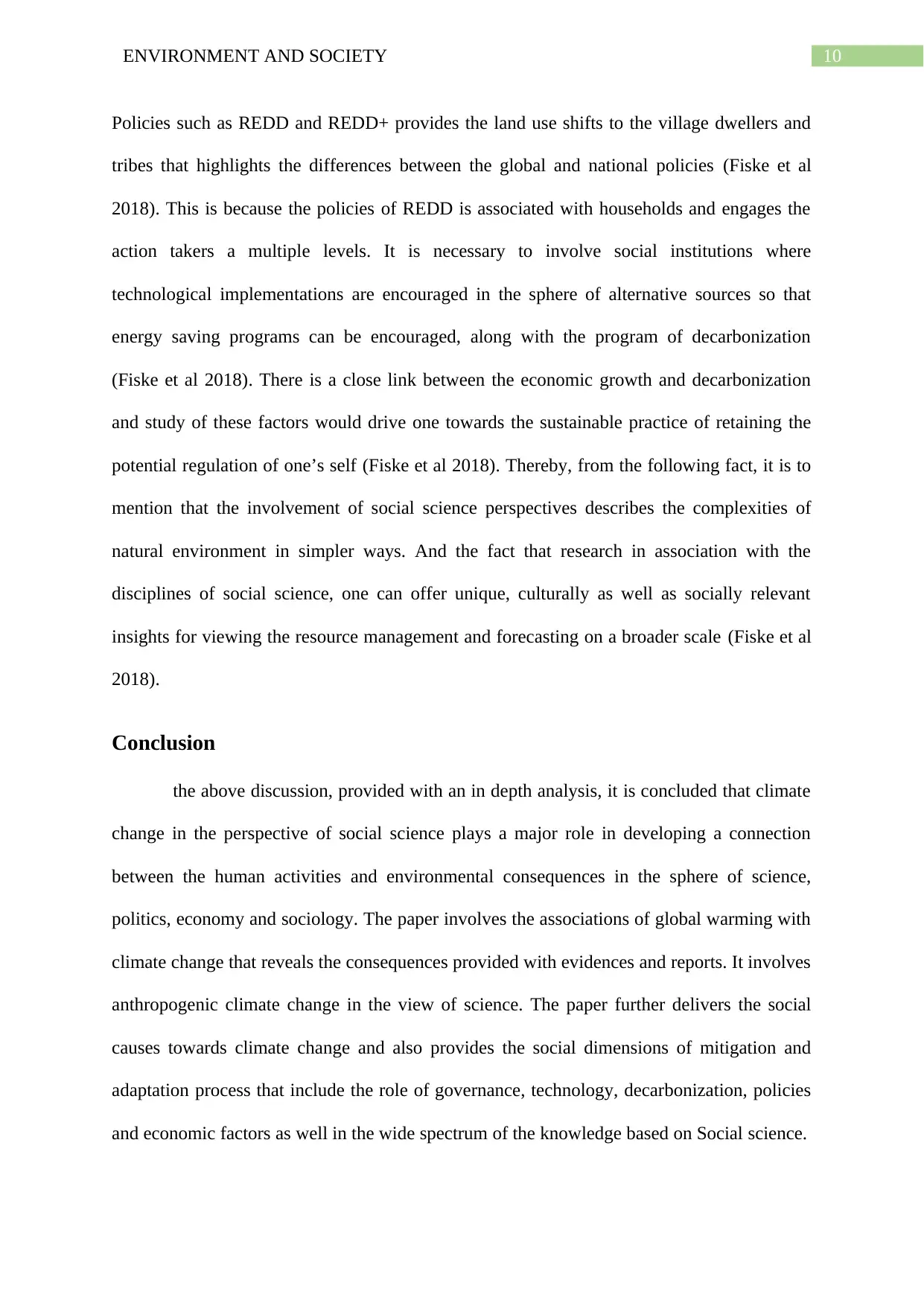
10ENVIRONMENT AND SOCIETY
Policies such as REDD and REDD+ provides the land use shifts to the village dwellers and
tribes that highlights the differences between the global and national policies (Fiske et al
2018). This is because the policies of REDD is associated with households and engages the
action takers a multiple levels. It is necessary to involve social institutions where
technological implementations are encouraged in the sphere of alternative sources so that
energy saving programs can be encouraged, along with the program of decarbonization
(Fiske et al 2018). There is a close link between the economic growth and decarbonization
and study of these factors would drive one towards the sustainable practice of retaining the
potential regulation of one’s self (Fiske et al 2018). Thereby, from the following fact, it is to
mention that the involvement of social science perspectives describes the complexities of
natural environment in simpler ways. And the fact that research in association with the
disciplines of social science, one can offer unique, culturally as well as socially relevant
insights for viewing the resource management and forecasting on a broader scale (Fiske et al
2018).
Conclusion
the above discussion, provided with an in depth analysis, it is concluded that climate
change in the perspective of social science plays a major role in developing a connection
between the human activities and environmental consequences in the sphere of science,
politics, economy and sociology. The paper involves the associations of global warming with
climate change that reveals the consequences provided with evidences and reports. It involves
anthropogenic climate change in the view of science. The paper further delivers the social
causes towards climate change and also provides the social dimensions of mitigation and
adaptation process that include the role of governance, technology, decarbonization, policies
and economic factors as well in the wide spectrum of the knowledge based on Social science.
Policies such as REDD and REDD+ provides the land use shifts to the village dwellers and
tribes that highlights the differences between the global and national policies (Fiske et al
2018). This is because the policies of REDD is associated with households and engages the
action takers a multiple levels. It is necessary to involve social institutions where
technological implementations are encouraged in the sphere of alternative sources so that
energy saving programs can be encouraged, along with the program of decarbonization
(Fiske et al 2018). There is a close link between the economic growth and decarbonization
and study of these factors would drive one towards the sustainable practice of retaining the
potential regulation of one’s self (Fiske et al 2018). Thereby, from the following fact, it is to
mention that the involvement of social science perspectives describes the complexities of
natural environment in simpler ways. And the fact that research in association with the
disciplines of social science, one can offer unique, culturally as well as socially relevant
insights for viewing the resource management and forecasting on a broader scale (Fiske et al
2018).
Conclusion
the above discussion, provided with an in depth analysis, it is concluded that climate
change in the perspective of social science plays a major role in developing a connection
between the human activities and environmental consequences in the sphere of science,
politics, economy and sociology. The paper involves the associations of global warming with
climate change that reveals the consequences provided with evidences and reports. It involves
anthropogenic climate change in the view of science. The paper further delivers the social
causes towards climate change and also provides the social dimensions of mitigation and
adaptation process that include the role of governance, technology, decarbonization, policies
and economic factors as well in the wide spectrum of the knowledge based on Social science.
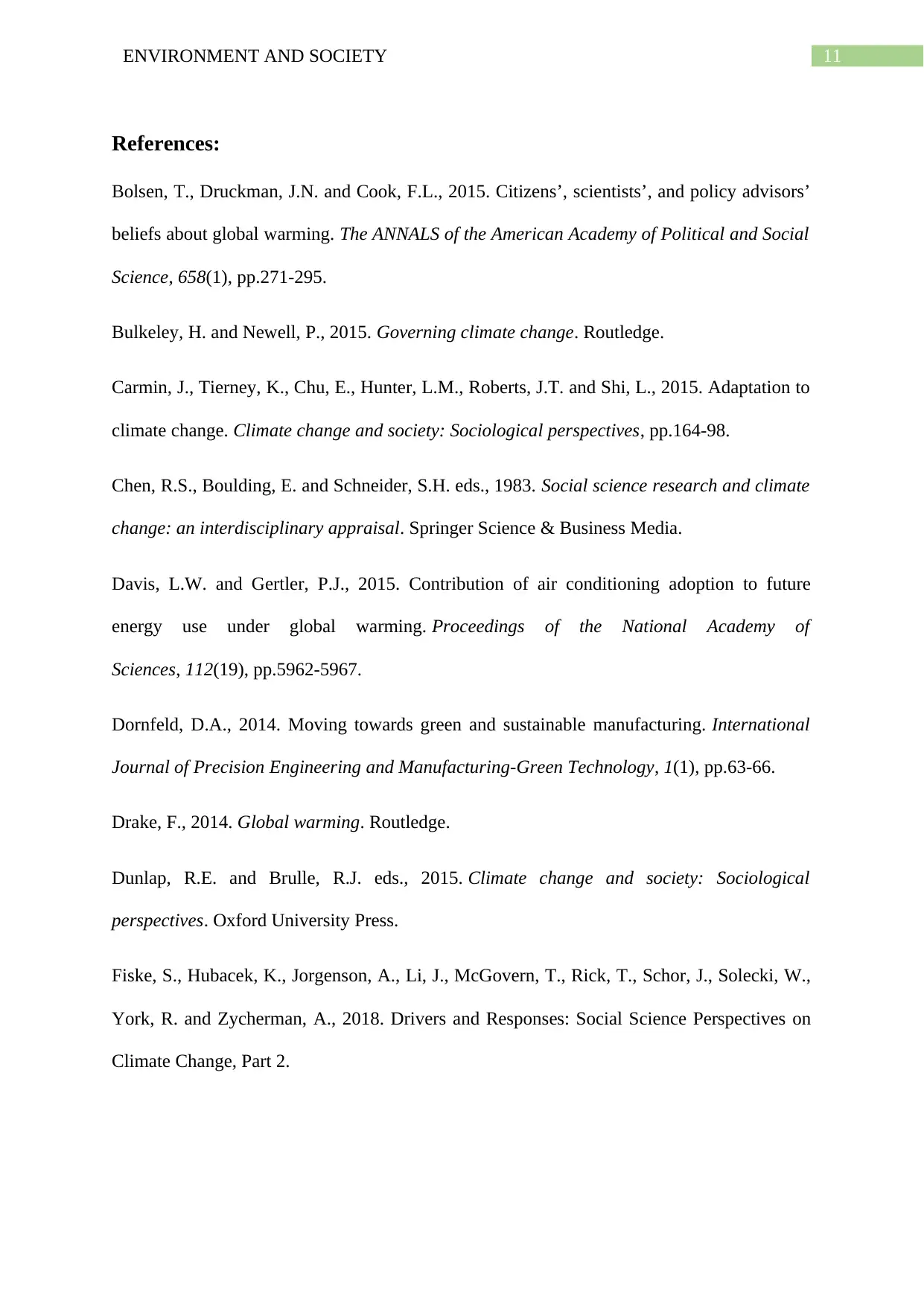
11ENVIRONMENT AND SOCIETY
References:
Bolsen, T., Druckman, J.N. and Cook, F.L., 2015. Citizens’, scientists’, and policy advisors’
beliefs about global warming. The ANNALS of the American Academy of Political and Social
Science, 658(1), pp.271-295.
Bulkeley, H. and Newell, P., 2015. Governing climate change. Routledge.
Carmin, J., Tierney, K., Chu, E., Hunter, L.M., Roberts, J.T. and Shi, L., 2015. Adaptation to
climate change. Climate change and society: Sociological perspectives, pp.164-98.
Chen, R.S., Boulding, E. and Schneider, S.H. eds., 1983. Social science research and climate
change: an interdisciplinary appraisal. Springer Science & Business Media.
Davis, L.W. and Gertler, P.J., 2015. Contribution of air conditioning adoption to future
energy use under global warming. Proceedings of the National Academy of
Sciences, 112(19), pp.5962-5967.
Dornfeld, D.A., 2014. Moving towards green and sustainable manufacturing. International
Journal of Precision Engineering and Manufacturing-Green Technology, 1(1), pp.63-66.
Drake, F., 2014. Global warming. Routledge.
Dunlap, R.E. and Brulle, R.J. eds., 2015. Climate change and society: Sociological
perspectives. Oxford University Press.
Fiske, S., Hubacek, K., Jorgenson, A., Li, J., McGovern, T., Rick, T., Schor, J., Solecki, W.,
York, R. and Zycherman, A., 2018. Drivers and Responses: Social Science Perspectives on
Climate Change, Part 2.
References:
Bolsen, T., Druckman, J.N. and Cook, F.L., 2015. Citizens’, scientists’, and policy advisors’
beliefs about global warming. The ANNALS of the American Academy of Political and Social
Science, 658(1), pp.271-295.
Bulkeley, H. and Newell, P., 2015. Governing climate change. Routledge.
Carmin, J., Tierney, K., Chu, E., Hunter, L.M., Roberts, J.T. and Shi, L., 2015. Adaptation to
climate change. Climate change and society: Sociological perspectives, pp.164-98.
Chen, R.S., Boulding, E. and Schneider, S.H. eds., 1983. Social science research and climate
change: an interdisciplinary appraisal. Springer Science & Business Media.
Davis, L.W. and Gertler, P.J., 2015. Contribution of air conditioning adoption to future
energy use under global warming. Proceedings of the National Academy of
Sciences, 112(19), pp.5962-5967.
Dornfeld, D.A., 2014. Moving towards green and sustainable manufacturing. International
Journal of Precision Engineering and Manufacturing-Green Technology, 1(1), pp.63-66.
Drake, F., 2014. Global warming. Routledge.
Dunlap, R.E. and Brulle, R.J. eds., 2015. Climate change and society: Sociological
perspectives. Oxford University Press.
Fiske, S., Hubacek, K., Jorgenson, A., Li, J., McGovern, T., Rick, T., Schor, J., Solecki, W.,
York, R. and Zycherman, A., 2018. Drivers and Responses: Social Science Perspectives on
Climate Change, Part 2.
⊘ This is a preview!⊘
Do you want full access?
Subscribe today to unlock all pages.

Trusted by 1+ million students worldwide
1 out of 14
Related Documents
Your All-in-One AI-Powered Toolkit for Academic Success.
+13062052269
info@desklib.com
Available 24*7 on WhatsApp / Email
![[object Object]](/_next/static/media/star-bottom.7253800d.svg)
Unlock your academic potential
Copyright © 2020–2026 A2Z Services. All Rights Reserved. Developed and managed by ZUCOL.





